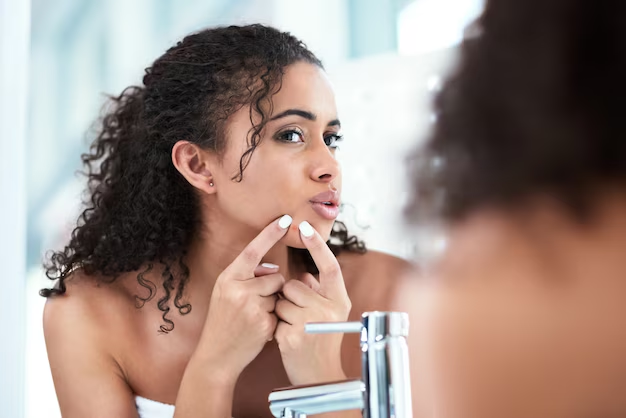Understanding Rosacea: Can You Catch It Like a Cold?
When you notice a persistent redness on your cheeks or nose, it’s natural to worry about whether it might be contagious. Rosacea, characterized by facial redness and sometimes bumps, is a chronic skin condition that puzzles many. If you've ever wondered if rosacea is contagious, you're not alone—this is a common question. Let's delve into this topic, explore its nuances, and demystify some myths surrounding this condition.
What Exactly is Rosacea?
Rosacea is a chronic skin disorder primarily affecting the face. It's marked by episodes of facial flushing, redness, visible blood vessels, and sometimes acne-like bumps. Although the condition is more prevalent in fair-skinned individuals, anyone can develop it. Despite its noticeable symptoms, the root cause of rosacea remains elusive to medical professionals and researchers alike.
Key Signs and Symptoms
Though rosacea manifests differently in each person, it typically features the following symptoms:
- Persistent Redness: This is the hallmark of rosacea, usually found on the cheeks, nose, chin, and forehead.
- Visible Blood Vessels: Often called "telangiectasia," these small blood vessels become visible on the skin's surface.
- Bumps and Pimples: Sometimes mistaken for acne, these can appear as red, swollen bumps.
- Eye Problems: Known as ocular rosacea, this can cause eye dryness, irritation, and swollen eyelids.
- Thickened Skin: Some individuals develop thickened skin, especially around the nose area, a condition called rhinophyma.
Is Rosacea Contagious?
The simple answer is no, rosacea is not contagious. You cannot catch it from another person, nor can you pass it on through physical contact. This skin condition isn't caused by a virus, bacterium, or fungus that can be spread to others. Understanding this can ease social concerns and clarify misunderstandings about rosacea.
Why It's Not Contagious
Non-infectious Nature: Unlike contagious conditions, rosacea results from internal body mechanisms rather than external infectious agents. Factors like genetics and immune system irregularities play crucial roles.
Genetic Predisposition: Research suggests that rosacea tends to run in families, which points more towards a genetic link than an infectious one.
External Triggers: Various environmental and lifestyle triggers, such as sunlight, stress, and spicy foods, may exacerbate rosacea but do not cause the condition to spread.
Exploring Potential Triggers
While rosacea isn't contagious, several factors can trigger or worsen its symptoms. Understanding these can help manage and potentially alleviate outbreaks.
Common Triggers
- Sun Exposure: Prolonged sunlight is a well-known rosacea trigger due to UV radiation causing skin damage.
- Dietary Factors: Spicy foods, alcohol, and hot drinks can contribute to flare-ups.
- Emotional Stress: Anxiety and emotional stress can lead to facial flushing.
- Extreme Temperatures: Whether it's hot or cold, drastic temperatures can exacerbate symptoms.
- Skincare Products: Certain topical products containing alcohol or fragrance may irritate sensitive skin.
Managing Triggers for Better Control
Identifying your personal triggers and trying to avoid them as much as possible can play a pivotal role in rosacea management. Keep a rosacea diary to track flare-ups and their possible causes. Note any patterns that arise, which can alert you to what might be best to avoid.
Who is at Risk?
Understanding the risk factors can help individuals be more aware and proactive about their skin health, even though rosacea itself isn’t contagious.
Factors Increasing Rosacea Risk
- Fair Skin and Blond Hair: People with these characteristics are more susceptible.
- Female Gender: Women are slightly more prone to developing rosacea, although men may experience more severe symptoms.
- Aged Between 30-50: Middle-aged individuals are most commonly affected.
- Family History: A family background of rosacea increases risk.
- Northern European Descent: Individuals with this ancestry often have higher incidence rates.
Seeking Professional Insight
While online research can provide valuable information, consulting a dermatologist is vital for anyone experiencing worrying skin symptoms. Dermatologists can not only diagnose rosacea but also suggest treatment options that can mitigate symptoms.
Typical Diagnostic Process
- Physical Examination: A doctor will typically assess your skin and inquire about your symptoms and family history.
- Exclusion of Other Conditions: Some conditions like lupus and eczema can mimic rosacea symptoms and need to be ruled out.
- Ophthalmologic Examination: As rosacea can affect the eyes, eye exams might be needed to check for ocular symptoms.
Treatment and Management
While rosacea has no cure, numerous treatments can help manage its symptoms and provide relief. Following a dermatologist's tailored advice is essential for effective management.
Common Treatments
- Topical Medications: Creams and gels that reduce redness and inflammation.
- Oral Antibiotics: These may help control outbreaks by reducing inflammation.
- Laser Therapy: For visible blood vessels and persistent redness.
- Lifestyle Adjustments: Avoiding triggers and practicing strong sun protection.
Empowering Your Skin Journey
Navigating the world of rosacea can sometimes feel overwhelming, but staying informed empowers you to make effective choices. Remember, while rosacea may pose cosmetic concerns or discomfort, it doesn't define you or your worth. With the right strategies and support, your skin health can be managed and maintained.
Quick Recap & Tips
Here's a simple summary with some essential points and tips to remember:
- 🌟 Rosacea is not contagious: You can't catch or spread it.
- ⚡️ Identify triggers: Track and avoid known triggers to manage symptoms better.
- 🧴 Consult professionals: Dermatologists provide accurate diagnosis and tailored treatment plans.
- ☀️ Practice sun safety: Use sunscreen daily to prevent flare-ups.
- 📝 Keep a rosacea diary: Recognize patterns in your symptoms related to lifestyle, diet, and environment.
Understanding rosacea isn't just about knowing it isn't contagious—it's about recognizing how to live your best life with it. Embrace this knowledge and take actionable steps towards healthier skin!

